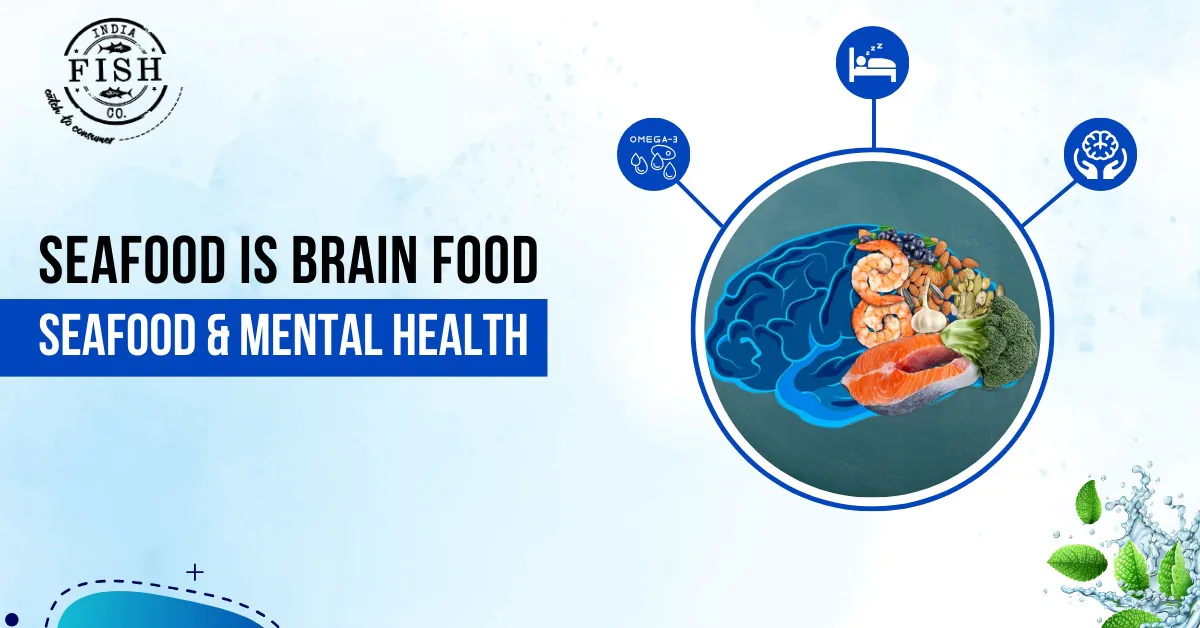Ever wondered how your diet influences your mood and cognitive abilities? It’s more interconnected than you might think. The foods we consume play a pivotal role in shaping our mental health, and seafood stands out as a star player in this domain. Rich in essential nutrients, seafood has been linked to improved brain function and emotional well-being.
Nutritional Profile of Seafood
Seafood isn’t just delicious; it’s a powerhouse of vital nutrients. Packed with omega-3 fatty acids, high-quality proteins, and a range of vitamins and minerals, it offers a comprehensive package for brain health. These nutrients work synergistically to support cognitive functions and maintain mental clarity.
Omega-3 Fatty Acids and Brain Health
Omega-3s, particularly EPA (eicosapentaenoic acid) and DHA (docosahexaenoic acid), are crucial for brain health. DHA, for instance, is a major structural component of the brain, influencing neuronal function and communication. Regular consumption of omega-3-rich seafood has been associated with enhanced cognitive performance and a lower risk of neurodegenerative diseases.
Seafood’s Role in Cognitive Development
From the womb to adolescence, omega-3s play a vital role in brain development. Pregnant women consuming adequate seafood can support fetal brain growth, leading to better cognitive outcomes in children. For youngsters, a diet rich in seafood contributes to improved learning abilities and behavioral patterns.
Seafood and Mood Regulation
Feeling blue? Your seafood intake might have something to do with it. Omega-3s influence the production of neurotransmitters like serotonin and dopamine, which regulate mood. Studies have shown that individuals with higher seafood consumption experience lower rates of depression and anxiety, highlighting its mood-stabilizing properties.
Preventing Cognitive Decline with Seafood
As we age, maintaining brain health becomes paramount. Research indicates that regular seafood consumption is linked to a reduced risk of cognitive decline and dementia. The anti-inflammatory properties of omega-3s, combined with other nutrients in seafood, offer neuroprotective benefits, preserving memory and cognitive functions.
Seafood’s Impact on Stress and Anxiety
In our fast-paced world, stress and anxiety are common companions. Omega-3s have been found to modulate the body’s stress response, reducing cortisol levels and promoting a sense of calm. Incorporating seafood into your diet can be a natural strategy to combat daily stressors and enhance resilience.
Vitamin D in Seafood and Mental Health
Vitamin D, often dubbed the “sunshine vitamin,” plays a role in mood regulation and cognitive function. Fatty fish like salmon and mackerel are excellent sources of vitamin D, making seafood a valuable addition to diets, especially in regions with limited sunlight exposure.
B Vitamins in Seafood and Their Neurological Benefits
B vitamins, particularly B12, are essential for neurological health. Deficiencies in B12 have been linked to memory issues and mood disturbances. Seafood, including shellfish and fish, provides a rich source of these vitamins, supporting mental clarity and energy levels.
Minerals in Seafood Supporting Mental Health
Minerals such as zinc, magnesium, and selenium found in seafood play roles in brain function and mood regulation. For instance, zinc is involved in neurotransmitter activity, while magnesium helps manage stress responses. Regular seafood consumption ensures an adequate intake of these essential minerals.
Recommended Seafood Intake for Mental Well-being
To harness the mental health benefits of seafood, it’s advisable to consume at least two servings per week. This can include a variety of fish and shellfish to ensure a broad spectrum of nutrients. However, it’s essential to balance intake and be mindful of potential allergens.
Potential Risks and Considerations
While seafood offers numerous benefits, it’s crucial to be aware of potential contaminants like mercury. Opting for low-mercury options such as salmon, sardines, and trout can mitigate risks. Additionally, sourcing seafood from reputable suppliers ensures quality and safety.
Incorporating Seafood into Your Diet
Introducing seafood into your meals can be both simple and delightful. Whether you’re a seasoned seafood lover or a beginner, there are countless ways to enjoy the brain-boosting benefits of fish and shellfish.
- Grilled and Baked Options: Opt for grilled salmon, baked mackerel, or roasted trout with herbs for a delicious yet healthy meal.
- Seafood in Salads and Wraps: Add tuna, shrimp, or smoked salmon to salads or wraps for a nutritious lunch.
- Soups and Stews: Fish soups and seafood chowders are warming and packed with nutrients.
- Quick and Easy Meals: Sardines on whole-grain toast or canned salmon mixed with avocado makes for a quick brain-boosting snack.
- Indian Delicacies: Traditional dishes like fish curry, tandoori prawns, and masala-grilled fish offer an enjoyable way to incorporate seafood into your diet.
The key is to make seafood a regular part of your meals while keeping variety in mind for maximum benefits.
Sustainable Seafood Choices
With growing concerns about overfishing and environmental impact, it’s essential to choose sustainable seafood options. Sustainable seafood is caught or farmed in ways that support healthy ocean ecosystems while ensuring future generations can continue enjoying seafood.
How to Choose Sustainable Seafood:
- Look for Certifications: Opt for seafood labeled with certifications like MSC (Marine Stewardship Council) or ASC (Aquaculture Stewardship Council).
- Buy from Reputable Suppliers: India Fish Co. provides fresh, high-quality, and responsibly sourced seafood in Delhi & Noida.
- Choose Low-Mercury Fish: Fish like sardines, salmon, and trout are excellent choices with low mercury levels.
- Support Local & Seasonal Catch: Buying locally sourced seafood ensures freshness and supports small-scale fisheries.
By making informed choices, you can enjoy the benefits of seafood while supporting marine conservation efforts.
Conclusion
The phrase “Seafood is Brain Food” isn’t just a catchy slogan—it’s backed by science. Packed with omega-3s, essential vitamins, and minerals, seafood has a profound impact on mental health, cognitive function, and emotional well-being. Regularly incorporating fish and shellfish into your diet can boost memory, reduce stress, and even protect against neurodegenerative diseases like Alzheimer’s.
If you want to enhance your mental well-being through diet, seafood is a must-have. So why wait? Start making seafood a staple in your meals today and experience the mental health benefits firsthand.
FAQs
- How often should I eat seafood for brain health?
It’s recommended to eat seafood at least twice a week to reap the brain-boosting benefits of omega-3 fatty acids and essential nutrients. - Can seafood help with depression and anxiety?
Yes! Omega-3s in seafood support neurotransmitter function, which helps regulate mood, reducing symptoms of depression and anxiety. - What is the best seafood for brain health?
Fatty fish like salmon, sardines, trout, and mackerel are among the best sources of omega-3s for optimal brain health. - Is seafood safe for pregnant women?
Yes, but it’s best to choose low-mercury options like salmon, shrimp, and tilapia while avoiding high-mercury fish like shark and king mackerel. - Where can I buy high-quality seafood in Delhi & Noida?
For fresh, high-quality, and responsibly sourced seafood, India Fish Co. is a trusted choice for online seafood shopping in Delhi & Noida.


